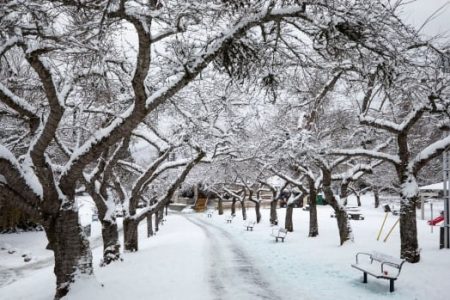Environment Canada has issued weather warnings for most of British Columbia as winter weather conditions tightened their grip across the province, creating dangerous cold and complicating travel ahead of the holiday season.
The weather agency says another round of snow for the South Coast started Monday afternoon, due to a low pressure weather system coming up from Washington state.
“We are looking at another system coming in from the Pacific,” said meteorologist Derek Lee Monday, in an interview with On the Coast‘s Rohit Joseph.
“With the cold temperatures in place — 10 to 15 degrees below seasonal — we are going to see a lot of heavy snow.”
Vancouver is getting hit with another blast of cold temperatures and snow, causing treacherous conditions and prompting the province to ask people to stay off the roads unless they have winter tires.
Lee says southern Vancouver Island will be one of the areas hit the hardest, and the snow that started falling on the island will be moving to the mainland around midnight.
Drive B.C. warned commuters and anyone out on Lower Mainland roads and highways Monday evening to expect congestion, leave extra travel time and make sure their vehicles are well-equipped for winter weather.
❄️ <a href=”https://twitter.com/hashtag/BCHwys?src=hash&ref_src=twsrc%5Etfw”>#BCHwys</a> Expect delays due to congestion on major routes in the <a href=”https://twitter.com/hashtag/BCLowerMainland?src=hash&ref_src=twsrc%5Etfw”>#BCLowerMainland</a> this evening. Leave extra travel time and plan ahead to winterize your vehicle. <a href=”https://twitter.com/hashtag/ShiftIntoWinter?src=hash&ref_src=twsrc%5Etfw”>#ShiftIntoWinter</a> <a href=”https://twitter.com/hashtag/BCStorm?src=hash&ref_src=twsrc%5Etfw”>#BCStorm</a> <a href=”https://t.co/QZcacRxDjg”>pic.twitter.com/QZcacRxDjg</a>
—@DriveBC
The Greater Victoria area, the Malahat Highway and the Southern Gulf Islands can expect as much as 25 centimetres, while Metro Vancouver and the Fraser Valley can expect 10-20 centimetres.
It comes after 10-15 centimetres fell on the South Coast on Sunday morning.
Environment Canada expects a break in the snow on Wednesday before it picks up again on Thursday or Friday. Meteorologists said below-seasonal temperatures will stick around throughout next week, with maximum temperatures in Metro Vancouver “struggling” to break –5 C.
“It looks like the cold will likely linger with us until Friday,” said Lee, explaining that the forecast for this weekend is largely uncertain with back-to-back storm systems lined up, some of which could potentially bring in warmer air.
“It can be snow but quickly changing over to rain for the weekend,” he said.
“Definitely prepare yourself for changing weather conditions: snow to rain or even freezing rain in the forecast later on this week.”
Sunday’s snowfall led to a number of road closures and flight delays at Vancouver International Airport as well as the airports in Victoria and Kelowna. Several highways, including Highway 1 and the Coquihalla Highway, were either littered with spun-out vehicles or forced to close entirely.
The province said “drivers are advised to stay off the road unless their vehicle is properly equipped with winter tires.”
For those with winter tires who have to drive, a statement Monday said drivers should pack an emergency kit in their vehicles.
WATCH | Tips and tricks for driving in the snow:
CBC Vancouver host Lien Yeung takes a driving lesson at Mount Seymour with Driving Unlimited Academy instructor Patrick Ah-Yu, who shows her how to get a car winter-ready and provides tips on driving in snowy conditions.
Extreme cold, risk of frostbite in northern B.C.
In the northern half of the province, more extreme cold is in the forecast for regions including Chilcotin, Quesnel, Williams Lake, Prince George, Stuart and 100 Mile.
Frigid Arctic air is pushing temperatures as low as –30 C, with wind chill making it feel like –40 C.
“A very cold Arctic air mass is has settled over the region,” read a weather warning for the Cariboo region.
“Extreme cold puts everyone at risk. Risks are greater for young children, older adults, people with chronic illnesses, people working or exercising outdoors, and those without proper shelter.”
Arctic outflow warnings remain in place for the central and north coasts, including inland sections. Extreme cold warnings are also in place in the Muncho Lake Park, Dease Lake, Cassiar Mountains and Watson Lake regions in the far north.
Special weather statements warning of frostbite risk cover the Haines Road, Atlin, Teslin, Peace River, Williston and Fort Nelson regions.
In the southern Interior, extreme cold warnings are in place for the Elk Valley and Yoho Park regions, and a snowfall warning has been posted for the West Kootenay region.
Wind chill could make it feel like –35 C overnight near Elk Valley and Yoho Park, which straddle the B.C.-Alberta border.
Most of Alberta is also under extreme cold warnings, with wind chill making temperatures feel as cold as –40 C across much of the province.

